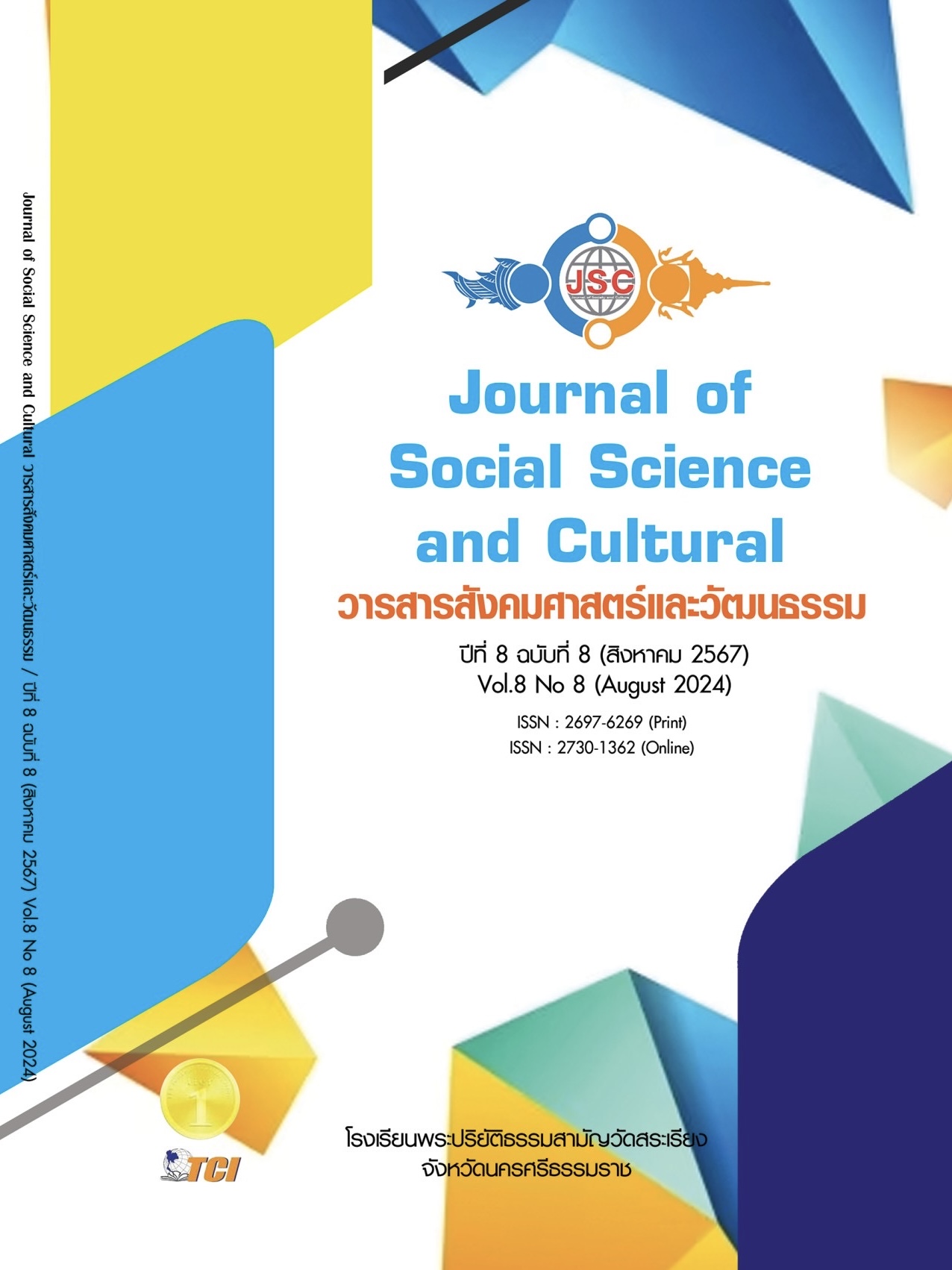THE BUDDHIST METHOD FOR PROMOTION OF GOOD GOVERNANCE IN TRANG MUNICIPALITIES
Main Article Content
Abstract
The three main goals of this research are as follows: 1) examine issues surrounding the effective organizational management of municipalities in Trang Province; 2) combine aspects of Buddhist approaches to support effective organizational management of municipalities in Trang Province; and 3) establish an organization. Learn about Buddhist techniques to support Trang Province municipalities' effective organizational management. This study is qualitative in nature. By gathering data via documents 25 persons participated in in-depth interviews, and 10 people had a group discussion. Interviews and descriptive techniques data analysis were used as research tools. The study's findings revealed that: 1) Lack of planning, or operating without a plan, is a challenge for municipalities in Trang Province when it comes to effective organizational management. Organizational characteristics include a quick-witted, transparent management style, ethics, and the law. Aspects related to personnel, including knowledge and competence, duties and responsibilities, sacrifice, and functioning as a team. Control and command elements include the rotation of national executives. Modifications to local development policies Coordination, including involvement from both inside and outside the company components of reporting including methodical monitoring and components of budget management like value for money. 2) Elements of the Buddhist approach to support Trang Province municipalities' excellent organizational management. It was discovered that the Buddhist method's components are as follows: The Sappurisadhamma Principles 2.1) align with the principles of the Middle Path, the Four Noble Truths, and the Four Brahmaviharas. and 2.2) Good governance standards, which align with the ideas of bias 4 and secularism 4 Parihaniyadhamma and Saraniyadhamma 6 and 3) An understanding of Buddhist techniques to support Trang Province municipalities' excellent organizational management. It was discovered that incorporating fresh information, known as the COMRE Model-that is, C = Criteria-was effective. O = Opportunity (creates chances for) Merit (Morality) = M Role (as well as duty) = R E stands for effectiveness (the effectiveness principle).
Article Details
References
จิรพรรณ บุญสิงห์. (2563). แนวทางการบริหารองค์กรปกครองส่วนท้องถิ่น (อปท.) เชิงพุทธ. วารสารการพัฒนาชุมชนท้องถิ่น, 22(2), 1-20.
จุรี วิจิตรวาทการ. (2560). หลักธรรมาภิบาลกับการดำเนินงานองค์กรปกครองส่วนท้องถิ่น. เรียกใช้เมื่อ 8 กันยายน 2565 จาก https://thaipublica.org/2016/01/corruption-perceptions-index-2015-thailand/
ชไมพร กิติ และคณะ. (2565). การบูรณาการหลักพุทธธรรมเพื่อเสริมสร้างประสิทธิภาพการบริหารงานขององค์กรปกครองส่วนท้องถิ่นในจังหวัดอุดรธานี. วารสารวิชาการสถาบันพัฒนาพระวิทยากร, 5(2), 48-60.
ธีรวิทย์ ทองนอก. (2561). การบริหารจัดการองค์กรปกครองส่วนท้องถิ่นเชิงพุทธบูรณาการของเทศบาลเมืองหนองปรือ จังหวัดชลบุรี. ใน วิทยานิพนธ์พุทธศาสตรดุษฎีบัณฑิต สาขาวิชาพระพุทธศาสนา. มหาวิทยาลัยมหาจุฬาลงกรณราชวิทยาลัย.
พระครูธรรมธรจิรชาติ พุทฺธรกฺขิโต และคณะ. (2566). พุทธบูรณาการเพื่อส่งเสริมประสิทธิผลการบริหารงานขององค์กรปกครองส่วนท้องถิ่นในจังหวัดจันทบุรี. วารสารพุทธนวัตกรรมและการจัดการ, 6(3), 9-10.
พระนพสิทธิ์ สุทฺธจิตโต. (2562). กระบวนการบริหารตามหลักธรรมาภิบาลเชิงพุทธขององค์การบริหารส่วนตำบลบ้านเอื้อม อำเภอเมือง จังหวัดลำปาง. วารสารสันติศึกษาปริทรรศน์ มจร, 7(4), 1008.
พระเมธาวินัยรส (สุเทพ พุทธจรรยา) และคณะ. (2566). การบริหารจัดการองค์กรปกครองส่วนท้องถิ่น: ปัญหา อุปสรรค และแนวทางแก้ไข. วารสารวิจัยวิชาการ, 6(1), 289-302.
พระอรรนพ อคฺคปญฺโญ (ไวยวรณ์). (2564). การบริหารงานตามหลักพุทธธรรมาภิบาลขององค์การบริหารส่วนตำบลนาหนัง อำเภอโพนพิสัย จังหวัดหนองคาย. ใน วิทยานิพนธ์พุทธศาสตรมหาบัณฑิต สาขาวิชาพระพุทธศาสนา. มหาวิทยาลัยมหาจุฬาลงกรณราชวิทยาลัย.
พิเชฐ ทั่งโต. (2562). แนวทางการบริหารองค์กรปกครองส่วนท้องถิ่น (อปท.) เชิงพุทธ 3 ประการ: บูรณาการหลักพุโทธธรรมเข้ากับหลักธรรมาภิบาล. วารสารมหาวิทยาลัยราชภัฏนครปฐม, 12(1), 1-18.
วารินทร์ จันทรัตน์. (2564). พุทธวิธีเพื่อนำไปสู่ความสำเร็จในการบริหารงานขององค์กรปกครองส่วนท้องถิ่น. วารสาร มจร สังคมศาสตร์ปริรรศน์, 10(5), 328-329.
อนันต์ วงศ์ศรี. (2562). การประยุกต์ใช้หลักธรรมาภิบาลขององค์กรปกครองส่วนท้องถิ่น กรณีศึกษาองค์การบริหารส่วนตำบลอำแพง อำเภอบ้านแพ้ว จังหวัดสมุทรสาคร. วารสารการบริหารรัฐประศาสศาสตร์, 37(2), 109-128.
Gulick, L. H. (1984). The development of administration as a science. American Political Science Review, 30(1), 127-135.


